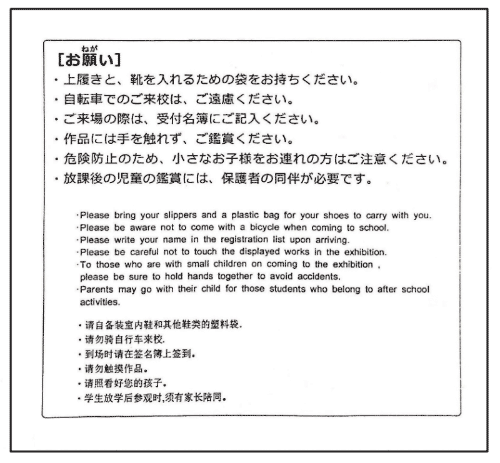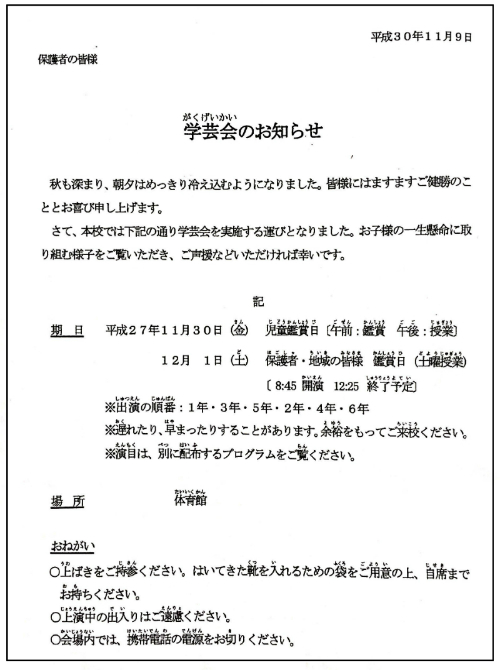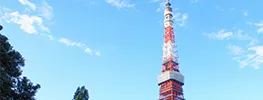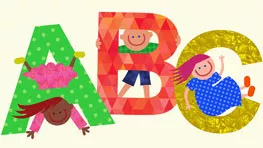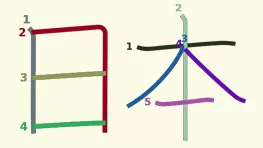Public Schools in Tokyo - English and Japanese Language Support
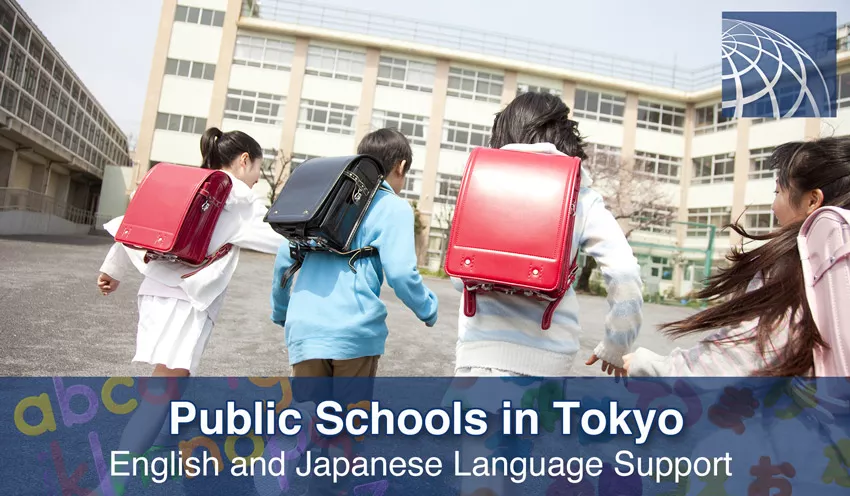
Current Status of Language Support in Public Elementary and Junior High Schools in Tokyo
Deciding to enroll your child in a public Japanese school may be a bit scary at first but is a great opportunity to have your child immerse themselves in Japanese culture. Some questions that may come to mind are “my child doesn’t understand Japanese how can they participate?”, “I want to take this opportunity to have my child learn Japanese, does the school have lessons for them?”. The answer to these and other related questions are that it depends. Some school districts may offer support in English but not lessons to learn Japanese and other may offer Japanese lessons but no English support.
If you are wondering which school is the best for your child, you can read this article and also find the list of international schools in Tokyo.
Below is a list of Tokyo 23 wards and the types of support they offer. All Japanese lessons mentioned below are free of charge. The system may have changed so please contact your local office for the latest information.
Examples of elementary school letters written for Japanese and foreign parents
A school letter written in Japanese, English and Chinese
A school letter with the pronunciation in kana next to Chinese characters
List of Japanese Language Support in Public Schools in Tokyo
Minato-ku
Minato-ku offers International Classes (in English) and Japanese support classes at Elementary Schools and a Junior High School.
For foreign elementary school students, an ESC (English Support Course) is available. ESC classes are conducted in English while students participate in a regular class. ESC students are assisted in English so that they are able to feel comfortable in their school life.
Elementary Schools (English Support Course)
Higashimachi Elementary School (available for grades 1-6)
Nanzan Elementary School (available for grades 1 and 2)
For further information on the subject please read Minato-ku’s website below.
Minato-ku International Class Information
Junior High School (Native English course)
Roppongi Junior High School
An English International Class is held once a week for native English speakers or students with competent English ability. For further details, please contact the School Administration Support Subsection.
Tel: 03-5472-3710 (Minato Call - City Information Service)
The schools below offer Japanese Support Classes once or twice a week. Students from other districts in Minato-ku can also join. For further details, please contact the School Administration Support Subsection mentioned above.
Elementary Schools (Japanese Support Classes)
Azabu Elementary School
Kogai Elementary School
Junior High School (Japanese Support Classes)
Roppongi Junior High School
Adachi-ku
No Japanese language support is available
Arakawa-ku
Elementary School
Volunteers offer support through interpretation (they come to the student’s class to interpret 1 - 3 times a week.)
Junior High School
Japanese lessons are available at the Arakawa Education Center for students.
Japanese classes are held in the morning. Students participate in their regular classes in the afternoon.
Bunkyo-ku
Elementary School and Junior High School
A Japanese instructor will go to their school and teach students same content which is taught in the regular class.
Chiyoda-ku
Kindergarten, Elementary School, and Junior High School
Volunteer supporters are available for interpretation during the regular classes (maximum 50 hours)
Additionally, Japanese language lessons are available.
Chuo-ku
Elementary School and Junior High School
Volunteer supporters are available for interpretation during the regular classes.
There is no Japanese language lessons available.
Edogawa-ku
Japanese language lessons and volunteer support for interpretation are available.
Elementary School
Kasai and Ichinoe Elementary Schools
Junior High School
Kasai and Koiwa Daiyon Junior High Schools
Komatsugawa Daini Junior High (evening class)
Itabashi-ku
Japanese language lessons are available.
Elementary School
Shingashi, Itabashi Dairoku, and Itabashi Daihachi Elementary Schools
Junior High School
Itabashi Daini and Shimura Daini Junior High Schools
Katsushika-ku
No Japanese language support is available.
Kita-ku
Elementary School (Grade 1-2)
Volunteer interpretation supporters during the regular class (in Chinese and Korean, English is not available)
Elementary School and Junior High School (Grade 3-9)
Nishigaoka and Nishigahara Elementary Schools
Akabane Iwabuchi Junior High School
Students can take lessons at a school mentioned above even if the school is not in their school district.
Koto-ku
Volunteer interpretation supporters are available during regular classes once a week (not always in English).
Meguro-ku
Japanese language lessons are available.
Elementary School
Higashiyama, Dendo, and Higashine Elementary Schools
Junior High School
Higashiyama Junior High School
At schools, other than those mentioned above, an instructor will go to the school to provide Japanese lessons.
School districts are prescribed
Nakano-ku
Elementary School and Junior High School
Japanese instructors come to the school and give lessons on the same content as the regular class but in English.
Lesson hours: from 30 hours to 60 hours
Approximately 2 times a week x 2 hours x 3 months
Nerima-ku
Elementary School and Junior High School
Japanese instructors come to the school 1-2 times a week for 1-2 hours to provide Japanese lessons.
Ota-ku
Elementary School and Junior High School
Japanese lessons are available a few times a week.
Setagaya-ku
Elementary School and Junior High School
Held at mainly Umegaoka Junior High School
Japanese lessons are available every Saturday.
Junior High School
Japanese lessons are available on Wednesdays and Saturdays
Volunteer supporter’s interpretation assistance is also available (maximum of 36 hours for elementary school students, 40 hours for Junior high school students).
Shibuya-ku
Japanese lessons are available for Elementary School students.
Elementary School
Jingumae Elementary School
Junior High School
There is no support available.
Shinagawa-ku
Japanese language lessons are available.
Elementary School
Gotenyama Elementary School
Elementary school and Junior High School
NPO IWC supports Japanese lessons at Yamanaka elementary school in the morning.
Normally students take lessons for a maximum of 3 months, however if they wish, it is possible to continue taking classes for more than 3 months.
Shinjuku-ku
Elementary School and Junior High School
Japanese lessons are available at the Education Center, after the support there is also a volunteer’s interpretation support.
Suginami-ku
Elementary School and Junior High School
There is no specific type of support offered. However, if the school principal find it necessary, the school will prepare after school Japanese lessons for the student.
Sumida-ku
Elementary School
Japanese lessons are available at Umewaka Elementary School.
Students from other elementary schools can join.
Volunteer interpretation supporters are also available during regular classes (at all elementary schools).
Junior High School
Japanese lessons in the morning at Sumida Kokusai Learning Center are available. Students will join the regular class in the afternoon.
Taito-ku
Volunteer supporters provide interpretation during regular classes.
There is no support for Japanese lessons.
Toshima-ku
Elementary School
Japanese lectures
Ikebukuro, Housei Elementary School
Japanese lessons
Gyoko, Houyu Elementary school
Junior High School
Japanese lessons
Nishiikebukuro Junior High School
Lessons are also available at the Education Center.
More Information about Japanese Public Schools
You can learn more about Japanese public schools such as Yearly Activities, Education System and Public School Customs. You may also be interested in School Grade and Age Structures in Japan or How to Enroll in a Japanese Public School and Materials You Need.
>> List of international schools in Japan
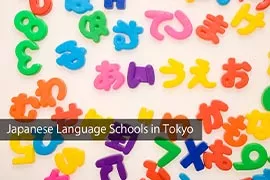
- Japanese Language Schools in Tokyo
- All the schools can be accessed in English, so please do not hesitate to consult with them showing what your requirements are.

- Rental Apartments & Houses in Tokyo
- Listings of popular and luxurious rental apartments, condominiums, and houses designed with expats in mind.

- Apartments & Houses for Sale in Tokyo
- Listings of apartments, condominiums, and houses available for purchase in Tokyo.
